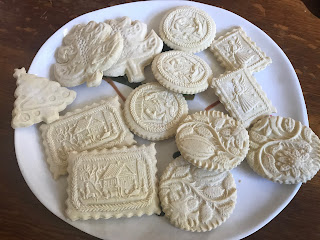Getty Images
Marc Pettaway and his troupe of Summer Mummers created one of the happiest memories of my youth. One summer this esteemed theatre director cast my good friend Mary Lea Latimer as Helen Keller with me as her teacher Annie Sullivan for a series of scenes from The Miracle Worker. We agreed to enact the scene with as much realism as teenagers could muster, and, even as I got slapped around by Helen mercilessly, I loved every minute of that summer. And I've admired Anne Sullivan ever since for her selfless dedication to saving the life of a little girl destined to a life of meager experiences, a paucity of language, and even the possibility of an institutionalized life. Annie changed all that when she worked her miracles and gave the precious gift of language to Helen.
There's a word for such a person--thaumaturge. It means a worker of wonders, miracles, a magician, and it was first recorded in 1705, traveling linguistically from Greek (thaumatourges) to Latin (thaumaturgius), meaning wonder worker.
When you think of miracle workers throughout history, no doubt you think of Jesus, but miracle men and women have existed in every culture throughout time. In fact, religions exist to a large degree because of these miracle workers--Mohammed, Buddha, Hinn and Bonnke, St. Francis Xavier, and even St. Guinefort the dog, just a few of those thaumaturges who took part in miraculous occurrences quite distinct from the natural order.
Bing Images
While these mystical occurrences are either the basis of our religious beliefs or simply an intriguing story, the real focus of this blog post is less esoteric and more suitable for the general public--you and me, and our ordinary circle of friends and family who recognize that our success in life is frequently attributable to the miraculous, selfless behavior of people who care about us. At the top of the list are the angels God has placed in our path along the way--parents, friends, teachers, ministers, and even the small acts of kindness from generous strangers. They may not have contributed the little fishes and loaves that fed the crowds, but perhaps they turned your day around with their generous spirit or guided the direction of your life.
These minor thaumaturges should never be disparaged or underestimated, but before you develop a co-dependency on merciful miracle workers who show up for you, look in the mirror. You are the first and foremost thaumaturge of your life. There will certainly be times when no one comes to your rescue, but when that happens, you have the option to pull the sword out of the stone for yourself and take the lead. How? By making good, maybe new, decisions about your life and following through on them, and when they don't work, you turn to plan B. Remember, no one has put you on a timeline--no one makes good decisions all the time, which means we constantly have second chances. The news gets even better when you realize that you are not obligated to other people's opinions. No one knows your wants and needs better than you do, and taking stock of them often is the best way to plan the necessary changes in your life. Below is a short list of five tactics for the thaumaturge you are:
1. Make an assessment of where you are now and where you want to be in the near future. Keeping a journal helps. Begin to see yourself as a winner, but don't stop there. Do something each day to get closer to your goals.
2. Begin or continue a savings account that will be an emergency fund. Be frugal in your spending. Do not overlook resale and thrift shops! Learn to cook and go out to restaurants for special occasions if necessary. The list of inexpensive outings with friends is inexhaustible!
3. If your personal assessment requires you to go back to school, do it. Find the most affordable program without going into massive debt. Avoid making excuses or following unwanted advice if this is an important part of your plan.
4. Take care of your mind, body, spirit: Eat healthy foods, exercise, meditate or find a church or spiritual group. Always count your blessings.

5. Give back to others whenever you can--a kind word, friendship, a hot meal. When we do good things for others, our old brains think we're doing it for ourselves. You get two feel-good moments for the price of one!
We are living in an age of chaos filled with greed and self-centeredness. Miracles are precious gifts that do not thrive in chaos. Let your decisions about your life be made in peaceful thoughtfulness, and watch the miracles bloom!

















